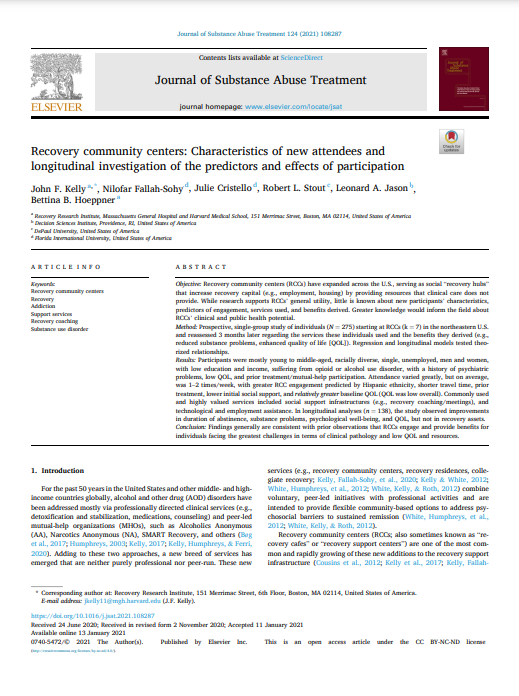Headline
A longitudinal study found that participants of recovery community centers (RCCs) had increased rates of substance use abstinence, psychological well-being, and quality of life after three months of engagement.
Context
RCCs are peer-led organizations that blend professional services with mutual support. RCCs focus on building up “recovery capital” of their members, which may include support with skills for managing personal relationships or connection to housing services. Despite the recent and rapid growth of these centers in the U.S., there are a lack of systemic and longitudinal studies exploring the effectiveness of RCCs at sustaining recovery.
This study examined five aspects of RCC members beginning their recovery over a three-month period: (1) characteristics; (2) frequency of use of the RCC; (3) factors related to greater RCC engagement; (4) types of RCC services used most; and (5) recovery benefits after three months of RCC engagement.
Findings
Study participants were comprised of 275 members from seven RCCs. Individuals were primarily white, single males with low-income. The majority of participants reported polysubstance use, were current smokers, and had histories of a mental health disorder. Many had participated in Alcoholics Anonymous or Narcotics Anonymous, roughly half were in treatment, and one-third had current criminal-legal system involvement. In the 90-days following a baseline survey, participants attended an RCC on average twice per week. The most significant factors related to continued RCC engagement related to transportation, travel time, social support for recovery, and history of outpatient treatment. The most commonly used RCC services were recovery meetings that support all approaches to recovery, including medications for opioid use disorder, and peer-led support groups.
At the end of the three-month study, participants reported increased substance use abstinence, reduced problems related to substance use, as well as improved psychological well-being and quality of life. Improvements were not found for recovery capital — the strength of internal and external resources that individuals can draw upon to sustain recovery.
Takeaways
RCCs offer a promising model to engage people beginning their recovery journeys and helping them find supports to sustain their recovery. Criminal legal system agencies may consider increasing referrals to RCCs for people leaving incarceration, given high relapse rates for this population. The authors note that further study is needed, particularly studies with a comparison group.

